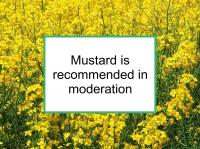Like horseradish sauce, mustard is made from a cruciferous vegetable with chemopreventive properties. The bright yellow mustard common in the U.S. is produced by mixing the ground seeds of the white or yellow mustard plant (Sinapis alba) into a paste with the addition of water, vinegar, turmeric and other spices or flavorings.
Mustard also can be made from brown or Indian mustard (Brassica juncea) and black mustard (Brassica nigra) seeds. Brown and French-style mustards typically are made with Indian mustard seeds. Mustard greens, which are the leaves of Indian mustard, are covered in the greens webpage.
Mustard is a good source of the chemopreventive isothiocyanate allyl isothiocyanate (AITC) and is also a source of phenethyl isothiocyanate (PEITC). In addition, mustard is a source of melatonin, and ferulic acid, as well as p-coumaric acid, p-hydroxybenzoic acid, protocatechuic acid, sinapic acid and vanillic acid. Components of mustard have been shown to have antimutagenic, antidiabetic, antifungal, antimicrobial and antioxidant effects.
Breast cancer-related effects of eating mustard
Mustard isothiocyanates
AITC and PEITC have been shown to have anti-breast cancer properties in a number of studies. For example, oral administration of AITC has been demonstrated to restore levels of proliferation and aromatase activity to near normal levels in a rat model of breast cancer. A 2021 study reported that AITC induced ER+/PR+ breast cancer cell death in a dose-dependent manner by causing DNA damage and altering DNA damage repair proteins.
PEITC has been shown to inhibit tumor cell angiogenesis. PEITC has also been found to enhance the sensitivity of the breast cancer cells to radiotherapy and doxorubicin. AITC has also been shown to reduce doxorubicin-induced heart damage (cardiomyopathy) in a rat model of chemotherapy.
Melatonin
Both white and black mustard seeds are excellent sources of melatonin. Melatonin protects against ER+ breast cancer by reducing aromatase activity within the breast, thereby decreasing estrogen production. Melatonin has also been found to reduce triple negative (ER-/PR-/HER2-) breast cancer growth, proliferation and migration in cell and animal studies. In addition, melatonin has been shown to reduce the cardiotoxicity associated with doxorubicin chemotherapy.
Ferulic acid
Ferulic acid has been shown to induce programmed cell death in triple negative breast cancer cells. Ferulic acid has also been shown to synergistically enhance the treatment effects of doxorubicin, paclitaxel, epirubicin and tamoxifen. In addition, ferulic acid has been demonstrated to reduce the heart damage caused by doxorubicin in an animal study of doxorubicin-induced cardiomyopathy.
Additional comments
Indian mustard can incorporate heavy metals
Indian mustard is known for its tendency to incorporate heavy metals such as cadmium, arsenic and lead. This means that heavy metal contamination of the soil can result in the accumulation of high concentrations of such substances in locally grown mustard, with potentially harmful health effects.
Heavy metal contamination of agricultural soils and stream sediments have been reported in many countries. Most of the Indian mustard consumed in the U.S. is imported from Canada, but it is also imported from India and other countries. Buyers of Indian or black mustard from specialty markets should be aware of its source and assure themselves of its safety and quality.
Mustard oil and mustard essential can be hazardous
Mustard oil
Although it is used widely in Indian cooking, depending on the mustard seeds from which it is prepared, mustard oil (mustard seed oil) can be hazardous to health because of its relatively high content of erucic acid and AITC. In addition, mustard oil adulteration (for example, with the addition of argemone oil, a poison) has occasionally been reported in India. Mustard oil has been shown to cause early carcinogenic changes in rat livers, especially when consumed after the oil has been heated to the boiling point. The FDA has not approved mustard oil for human consumption. We do not recommend using it.
Mustard essential oil
Mustard oil should not be confused with mustard essential oil (also known as volatile oil of mustard) which is produced by grinding the seeds, adding water, and extracting the resulting volatile oil by distillation. The high AITC content of mustard essential oil makes it frankly toxic when used undiluted.
Below are links to recent studies concerning this food and its components. For a more complete list of studies, please click on mustard.
